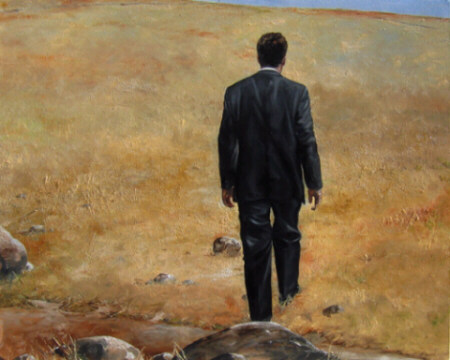
By labeling what was actually a complicated network of phenomena as "discipline," I was flattening my experience, and turning it into something monotonous and unpleasant. I felt as though I had been conditioned, in some perverse Pavlovian way. There would be a constraining of a desire to do something, and an almost immediate response of "unpleasant - don't want that - find a distraction or a way out." And then the stories ("this is stupid..."). But actually much more was going on, in much more complicated detail.
A second aspect of the subtlety of discipline: each of the ten sefirot contains each of the other ten. There a form of judgment that contains lovingkindness, as when a truly loving parent disciplines a child. And there is a form of endurance which contains inspiration, as when the seed of wonder is tended, and watered, so that it might germinate into something alive. So too, in the case of discipline, it's not merely restraint or determination corralling the selfish id and yoking it to a task. Rather, the restraint contained within it all sorts of other energies: compassion for myself (why was I on meditation retreat anyway?), which the Kabbalists call tiferet; the wisdom of the teachings (hochmah), and so forth. Really, within every constraining moment of gevurah, I could, with enough attention, feel in the body, heart, and mind the movements of other energies.
On the simplest level, this interpenetration of energies is no more novel than "keeping your eyes on the prize," remembering why you're doing all those pushups, or slaving away at the cubicle. In such situations, one simply recalls that there's a reason for the discipline, and focuses on the reason rather than the energy of the discipline itself. In so doing -- by moving away from the momentary experience -- we feel happier. That's not what is meant by "interpenetration of energies," however. Rather, the practice is to be so attentive to the energy itself that we can notice in the act of disciplining itself -- not as its external motive, but in the feel of the discipline -- notes of kindness, foundations of action, and so forth. Observing closely the nature of discipline is the opposite of focusing on happy thoughts instead of what's happening now. It's not about separating the prize from the process. Rather, it's about creating a rich taxonomy of emotional life.
Finally, as with any emotional state, it's considerably useful to tease apart the state (in the mind and body) from the seemingly immediate reaction to it. Usually, these two aspects are so tightly laminated one to the other that we don't even realize they are separate. You touch a hot stove, you pull your hand away. Feel a feeling you don't like, and you want to push it away too. But this is a childish way of being. It's like a boy refusing to eat mushrooms because the taste is unfamiliar, and thus "gross." A worthwhile emotional life will present a wide spectrum of feeling-tones, which we can observe, notice, and not push away according to some learned habit or instinct. To reduce this wide range to "like/don't like" and then try to get rid of everything on the wrong side is a cheapening of experience. Nor is it likely to work. Of course, we'd all rather be with pleasant feelings than unpleasant ones, but is arranging one's life in this way really going to succeed?
Psychological lamination notwithstanding, there is a space between the energy and the response -- and therein lie possibilities of freedom. Even during the simple act of revising this essay (after significant comments from my editor), I experienced a twitchiness and restlessness that I'm sure is familiar to many people. Emails came in, and I "had to" look. I thought of having a snack, surfing the web, cleaning up the house. Why? Aversion -- the desire to push away a particular mindstate, in this case an amalgam of gevurah, netzach, yesod, and binah, flattened and simplified into "discipline." The aversion seems so immediate that it's hard to imagine any other way of relating to its object. But by pausing, noticing how I'd clenched my jaw, noticing how rapid my breathing had become -- these phenomena began to loosen, and the aversion began to decrease.
Our culture's general assumption is that the good life has more of the good stuff and less of the lousy. So, when confronted with lots of lousy stuff -- inboxes, project plans -- I often experience aversion, and suffering, and suppose "if I only I were ____, there would be less lousy stuff and so I would be happier." But since the lousiness is intrinsic to life itself, that won't work. We have to change the way we relate to the lousy. As Sharon Salzberg, one of my teachers, likes to say, "It's not what's going on, it's how you relate to it." Meaning: the contemplative path is not about having certain feelings, seeing certain sights, and being in certain places. It's about relating to whatever feelings, sights, or places one encounters in a way that is mindful and skillful.
The Kabbalistic contribution to working with discipline is similar to the Buddhist-psychological one -- it teases it apart into its many component pieces -- but very different from our ordinary Western pop psychology, which sees it as a force constraining desire. As Foucault observed, discipline and desire enjoy a much richer relationship than mere repression and expression. But you can't explore that relationship without directing attention inward, and aiming "to create an inner stillness in which, like mice in a deserted house, capacities and awarenesses too wayward and too fugitive for everyday use may delicately emerge." (Alan McGlashan, The Savage and Beautiful Country)

4. How it goes
Well, I'm still not particularly mindful or skillful in regards to self-discipline. I still face the choices that require decision, and still evade some of them. And I still, exasperatingly, experience regret over paths not taken, and feel envious of my friends who have taken them to success and fame. And when sitting down to work, there is still the old dyadic thinking (want to do this / don't want to do this) and imprecision of attention to what qualities of mind are actually being engaged. I still leap to the story, the counter-story, and the variously violent struggles between them, even though I know, as I like to say to my students, that kicking your own ass is not the way to liberation.
It takes time.
Yet one paradox of contemplative practice is that the less you want to be rid of something, the more it slips away on its own. I've found that the less I resent the energy of discipline, the less that energy arises in the first place. Discipline itself is still required, to stay on task and, for example, to pay attention to details of grammar rather than the distracting objects on my desk. But the tension around the discipline does lessen a bit. It's tricky, because if I have "lessening tension" as my goal, the practice doesn't work. It really doesn't work; I'll only resent more because, dammit, my clever contemplative practices aren't working. But when I just accept and explore the energies of discipline, for their own sake, without expectation -- they shift. This is what the Hasidim like to call hamtaka, sweetening, and it's what we always ask of the aspect of gevurah. Not disappearing, not resolving, and, unfortunately, not becoming any simpler either. But just the slightest note of honey in a tannin-rich red wine.

March, 2005
On the anthropology of contemplative practice
February, 2005
January, 2005
November, 2004
September, 2004
Notes from and after retreat
Between contemplation and affirmation
What is 'energy'? Is it nonsense?
Sex, drugs, and God in all
February, 2004
January, 2004
November, 2003
November, 2003
July, 2003
James Turrell and the truth of light
April, 2003



Neurotic Visionaries & Paranoid Jews
April 7, 2005
Jews on Stage
Dan Friedman
Out of Bounds
Angela Himsel
Masoretic Orgasm
Hayyim Obadyah
Messianic Troublemakers: Jewish Anarchism
Jesse Cohn
The Hasidim
Hila Ratzabi
Discipline
Jay Michaelson
Archive
Our 640 Back Pages
Zeek in Print
Spring 2005 issue now on sale!
About Zeek
Mailing List
Contact Us
Subscribe
Tech Support
Links
From previous issues: Samantha Stiers
Hiding your Sins
Hal Sirowitz
The Hamas Class of 1992
Michael Shurkin
 Email us your comments
Email us your comments